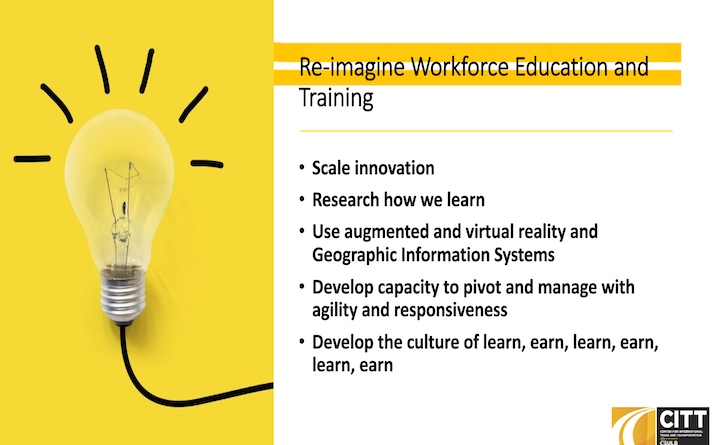Build Human Capitol
Collaboration between industry and academia is indispensable when it comes to better understanding changing workforce needs and required skill sets. The LA Metro College & University External Partners’ Meeting is held specifically to develop collaboration and communication between industry and academia. CITT’s Education and Workforce Program Developer, Deanna Matsumoto, presented her research on workforce development at LA Metro’s meeting in February. Matsumoto’s research focused on regional development needs and gaps for middle-skill workers—those with more than a high school degree, but less than a four-year college degree—in the transportation and supply chain industry sectors.
“This collaboration enables academia to know what institutional knowledge is needed to train those interested in working in our industry,” said by Marion Jane Colston, LA Metro’s Senior Director of Strategic & Organizational Planning. “It permits more time to share resources, knowledge, and offers professional development of our agency’s workforce.”
In her work, Matsumoto highlighted the need for digital skills among workers as technology in the logistics and transportation sector progresses and demands new hybrid occupations, digital communication platforms, and heavier data integration. The California State University Transportation Consortium-funded project, SoCal Regional Workforce Development Needs Assessment, demonstrated a need for upskilling and a focus on increasing digital literacy, as “50% of workers in the transportation and supply chain sectors have low or no digital skills.”
As the sectors develop, digital skills become increasingly integrated into all rungs of the employment ladder—including warehouse workers, truck drivers, project managers, and sales representatives. Technological advancements in the field help manage data, optimize production, and allow for heightened connection and transparency. In her presentation, Matsumoto also discussed the impact of COVID-19, which has forced businesses to both go lean, or contract, and digitize in a short window of time.
“What would previously have been a multi-year process to digitize business operations has been condensed into months, if not weeks, due to the imposition of shelter-in-place mandates,” she said.
Thus, the need for upskilling and training is urgent, especially as the timeline is sped up by disruptions and sudden large-scale adaptations. The importance of this meeting and collaboration was discussing how to best prepare the workforce for the continually changing landscape of requirements and acknowledging the role of higher education institutions and professional development programs. LA Metro’s retiring CEO, Phillip A. Washington, “has requested that there [be] a relationship between industry and academia,” a continued conversation between the workforce and training programs, as it is crucial to stay updated and interconnected in a world where change occurs rapidly. Matsumoto highlighted that companies should “build, not buy” human capital and knowledge, and work with both the incumbent workforce and new hires. She called for re-imagining workforce education and training by researching how we learn and integrate technologies such as augmented and virtual reality and Geographic Information Systems into day-to-day operations. Effective training and education are imperative, and expertise from organizations such as CITT and LA Metro can be combined to scale innovation and strengthen workforce development.

